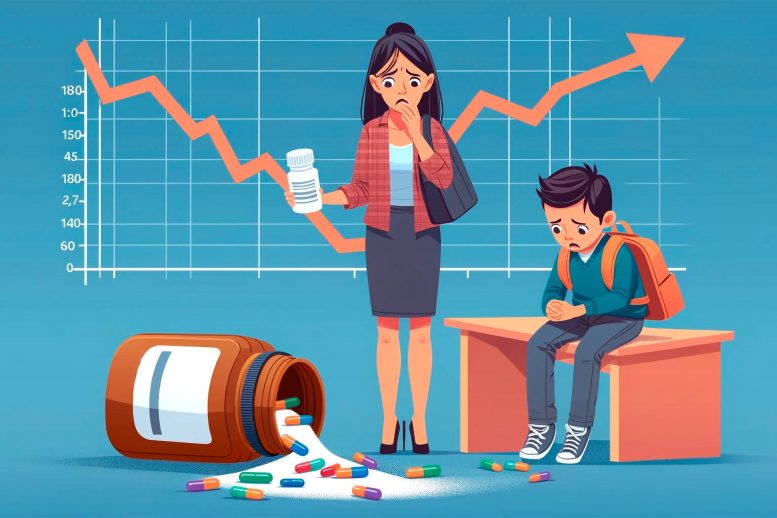
Experts call for patient and caregiver education and for development of improved child-resistant medication dispensing and tracking systems.
Attention-deficit/hyperactivity disorder (ADHD) is among the most common pediatric neurodevelopmental disorders. In 2019, nearly 10% of United States (U.S.) children had a diagnosis of ADHD. Approximately 3.3 million children, or roughly 5 out of every 100 children in the U.S., are currently prescribed medication for ADHD.
Increase in ADHD Medication Errors
In a new study, published recently in the journal Pediatrics, researchers at the Center for Injury Research and Policy and Central Ohio Poison Center at Nationwide Children’s Hospital investigated the characteristics and trends of out-of-hospital ADHD medication errors among people younger than 20 years old reported to U.S. poison centers from 2000 through 2021.
According to the study, the annual number of ADHD-related medication errors increased 299% from 2000 to 2021. During the study period, there were 87,691 medication error cases involving ADHD medications as the primary substance among this age group reported to U.S. poison centers, yielding an average of 3,985 individuals annually. In 2021 alone, 5,235 medication errors were reported, equalling one child every 100 minutes. The overall trend was driven by males, accounting for 76% of the medication errors and by the 6-12-year-old age group, accounting for 67% of the errors. Approximately 93% of exposures occurred in the home.
Common Medication Error Scenarios
Among medication errors involving ADHD medications as the primary substance, the most common scenarios were:
- 54% – “Inadvertently taken/given medication twice”
- 13% – “Inadvertently taken/given someone else’s medication”
- 13% – “Wrong medication taken/given”
“The increase in the reported number of medication errors is consistent with the findings of other studies reporting an increase in the diagnosis of ADHD among U.S. children during the past two decades, which is likely associated with an increase in the use of ADHD medications,” said Natalie Rine, PharmD, co-author of the study and director of the Central Ohio Poison Center at Nationwide Children’s Hospital.
Health Impacts and Prevention Strategies
In 83% of cases, the individual did not receive treatment in a healthcare facility; however, 2.3% of cases resulted in admission to a healthcare facility, including 0.8% to a critical care unit. In addition, 4.2% of cases were associated with a serious medical outcome. Some children experienced agitation, tremors, seizures, and changes in mental status. Children younger than 6 years old were twice as likely to experience a serious medical outcome and were more than three times as likely to be admitted to a healthcare facility than 6-19-year-olds.
“Because ADHD medication errors are preventable, more attention should be given to patient and caregiver education and development of improved child-resistant medication dispensing and tracking systems,” said Gary Smith, MD, DrPH, senior author of the study and director of the Center for Injury Research and Policy at Nationwide Children’s Hospital. “Another strategy may be a transition from pill bottles to unit-dose packaging, like blister packs, which may aid in remembering whether a medication has already been taken or given.”
Although prevention efforts should focus on the home setting additional attention should be given to schools and other settings where children and adolescents spend time and receive medication.
Reference: “Pediatric ADHD Medication Errors Reported to United States Poison Centers, 2000 to 2021” by Mikaela M. DeCoster, BS; Henry A. Spiller, MS, D.ABAT; Jaahnavi Badeti, MPH, BDS; Marcel J. Casavant, MD; Natalie I. Rine, PharmD, BCPS, BCCCP; Nichole L. Michaels, PhD; Motao Zhu, MD, MS, PhD; Gary A. Smith, MD, DrPH, 18 September 2023, PEDIATRICS.
DOI: 10.1542/peds.2023-061942
Data for this study were obtained from the National Poison Data System (NPDS), which is maintained by America’s Poison Centers, formerly the American Association of Poison Control Centers (AAPCC). Poison centers receive phone calls through the national Poison Help Line (1-800-222-1222) and document information about the product, route of exposure, individual exposed, exposure scenario, and other data, which are reported to the NPDS.
1 Comment
How many children are misdiagnosed with ADHD and given drugs needlessly. Probably 99% of them. Did anyone ever do a study on how these children do in adult life after being on these drugs all their adolescent life. No, why not.